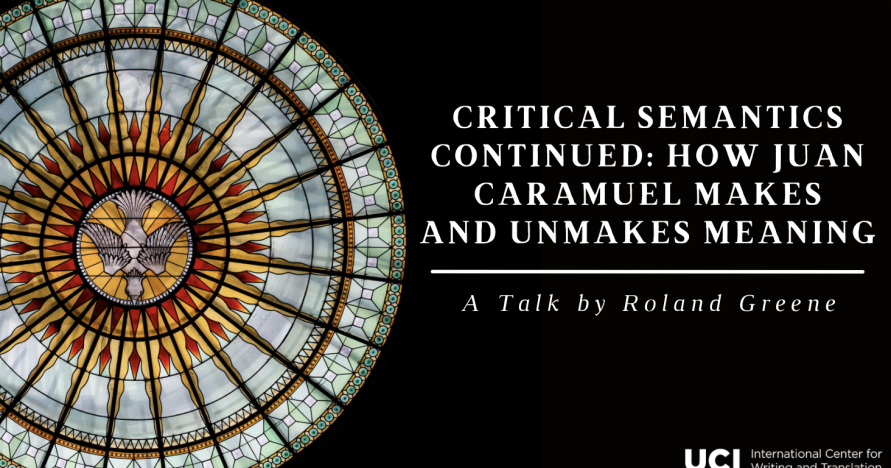
Join the International Center for Writing and Translation in collaboration with the Center for Early Cultures for a lecture by Roland Greene, Professor of Comparative Literature, Stanford University.
This event will be remote. RSVP HERE.
Professor Greene will deliver his lecture, "Critical Semantics Continued: How Juan Caramuel Makes and Unmakes Meaning."
Juan Caramuel’s Metametrica (1663) is one of the strangest books of the seventeenth century: a vast omnibus of materials out of which poems are made, the book devotes as much space to unmaking and remaking as to making. As we encounter permutational poems in various languages (including Latin, Spanish, Italian, Dutch, and Chinese), we are reminded of the contingency and vulnerability of all poems and the precarity of semantic meaning. The lecture reflects on Greene’s book Five Words: Critical Semantics in the Age of Shakespeare and Cervantes (2013) in view of the method offered there and considers how Caramuel’s unusual compilation demonstrates a “critical semantics” as a way of empowering poetry.

Roland Greene's research and teaching are concerned with the early modern literatures of England, Latin Europe, and the transatlantic world, and with poetry and poetics from the Renaissance to the present.
His most recent book is Five Words: Critical Semantics in the Age of Shakespeare and Cervantes (Chicago, 2013). Five Words proposes an understanding of early modern culture through the changes embodied in five words or concepts over the sixteenth century: in English, blood, invention, language, resistance, and world, and their counterparts in French, Italian, Spanish, and Portuguese.
Other books include Unrequited Conquests: Love and Empire in the Colonial Americas (Chicago, 1999), which follows the love poetry of the Renaissance into fresh political and colonial contexts in the New World; and Post-Petrarchism: Origins and Innovations of the Western Lyric Sequence (Princeton, 1991), a transhistorical and comparative study of lyric poetics through the fortunes of the lyric sequence from Petrarch to Neruda. Greene is the editor with Elizabeth Fowler of The Project of Prose in Early Modern Europe and the New World (Cambridge, 1997). His essays deal with topics such as the colonial baroque, Edmund Spenser's Faerie Queene and Amoretti, Sir Thomas Wyatt's poetry, and Shakespeare's The Tempest.
Greene is editor in chief of the fourth edition of the Princeton Encyclopedia of Poetry and Poetics (2012). Prepared in collaboration with the general editor Stephen Cushman and the associate editors Clare Cavanagh, Jahan Ramazani, and Paul Rouzer, this edition represents a complete revision of the most authoritative reference book on poetry and poetics.
In 2015-16 he served as President of the Modern Language Association. His theme for the 2016 Annual Convention in Austin, Texas was Literature and Its Publics: Past, Present, and Future.
At Stanford Greene is co-chair and founder of two research workshops in which most of his Ph.D. students participate. Renaissances brings together early modernists from the Bay Area to discuss work in progress, while the Poetics Workshop provides a venue for innovative scholarship in the broad field of international and historical poetics.
Greene has taught at Harvard and Oregon, where for six years he was chair of the Department of Comparative Literature. He is a member of the American Academy of Arts and Sciences.
For more information about his past and future courses, publications, conference papers and invited lectures, and professional activities, see Professor Greene's page in the Department of Comparative Literature.
